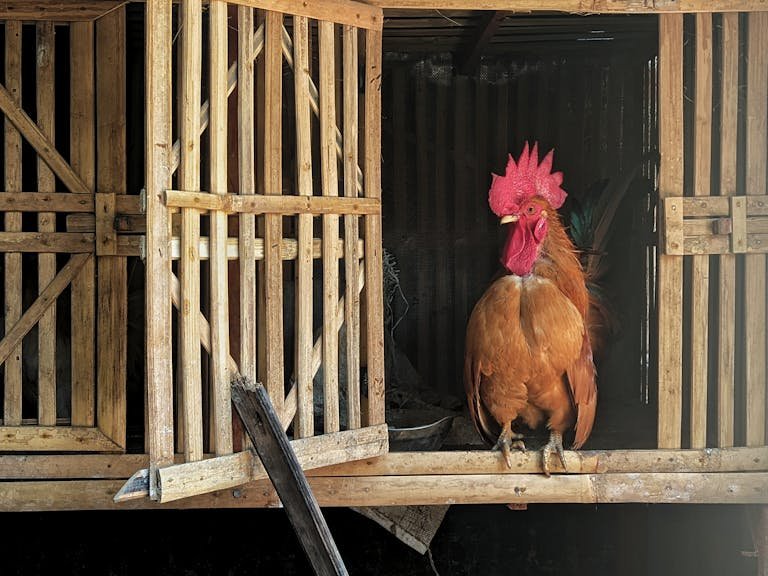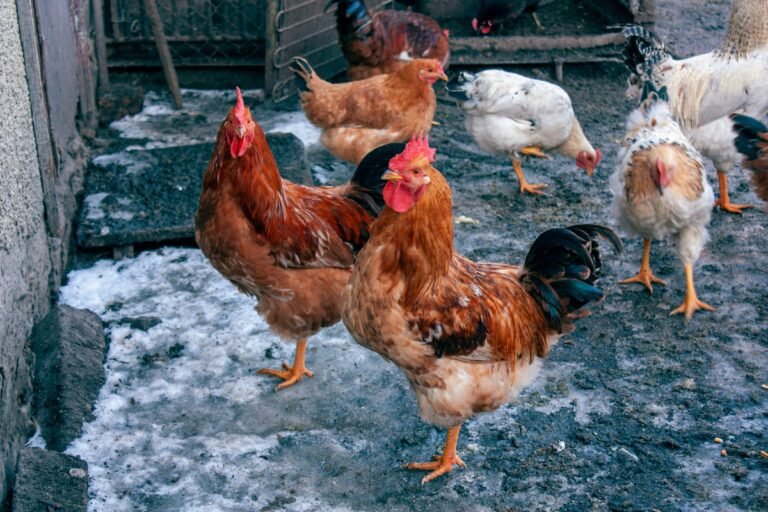Why Are My Chickens Dying? 4 Shocking Reasons

Chickens are relatively hardy creatures, but they can still succumb to a variety of issues that may lead to illness or death. Whether you’re a seasoned poultry farmer or someone with a backyard flock, understanding the common causes of chicken mortality is crucial for preventing losses and ensuring the health of your birds. In this guide, I will walk you through the most common factors that can lead to chicken deaths, detailing diseases, nutritional deficiencies, environmental hazards, and poor management practices.
Causes of Chicken Mortality
Chickens can die from a range of causes, including diseases, environmental conditions, poor nutrition, and improper management practices. Below are the main categories that I’ll explore in detail.
1. Diseases
Diseases are a leading cause of chicken deaths, and they can spread quickly through a flock. There are several types of diseases that can affect chickens, including viral, bacterial, fungal, and parasitic infections.
Viral Diseases
- Newcastle Disease:
- Symptoms: Respiratory distress, coughing, sneezing, paralysis, and sudden death.
- Transmission: Spread through the air, contaminated water, and infected equipment.
- Prevention: Vaccination and maintaining good biosecurity measures.
- Marek’s Disease:
- Symptoms: Paralysis, weight loss, and tumors on internal organs.
- Transmission: Spread by inhaling virus particles in feather dander.
- Prevention: Vaccination and regular cleaning of the coop.
- Avian Influenza:
- Symptoms: Severe respiratory distress, coughing, nasal discharge, and death within hours.
- Transmission: Spread through wild birds and contaminated equipment.
- Prevention: Quarantine and vaccination.
Bacterial Infections
- Salmonella:
- Symptoms: Diarrhea, lethargy, and reduced egg production.
- Transmission: Spread through contaminated food and water.
- Prevention: Good hygiene, clean water, and food storage.
- Coccidiosis:
- Symptoms: Blood in stool, diarrhea, weight loss, and lethargy.
- Transmission: Spread through contaminated litter and soil.
- Prevention: Maintain a clean coop, proper litter management, and consider vaccination.
- Mycoplasmosis:
- Symptoms: Respiratory issues, nasal discharge, swollen joints, and poor growth.
- Transmission: Spread through direct contact with infected birds.
- Prevention: Isolate new birds and maintain good biosecurity practices.
Fungal Infections
- Aspergillus (Aspergillosis):
- Symptoms: Respiratory problems, lethargy, and poor egg production.
- Transmission: Spread through contaminated feed and bedding.
- Prevention: Ensure clean, dry bedding and proper ventilation.
- Candidiasis (Thrush):
- Symptoms: White patches in the mouth and crop, poor growth, and reduced appetite.
- Transmission: Spread through contaminated food and water.
- Prevention: Provide clean water and avoid moldy feed.
Parasitic Infections
- Mites and Lice:
- Symptoms: Constant itching, feather loss, pale combs, and lethargy.
- Prevention: Regular cleaning of the coop, dusting chickens with mite powder, and checking birds for signs of infestation.
- Coccidia (Coccidiosis):
- Symptoms: Bloody stool, diarrhea, lethargy, and death if untreated.
- Transmission: Spread through contaminated bedding and soil.
- Prevention: Clean the coop regularly and rotate pasture areas to prevent buildup.
Read Also: Save Your Chickens Now! Cure Infectious Coryza Fast
2. Nutritional Deficiencies
Chickens need a balanced diet to maintain their health. Poor nutrition can lead to weakened immune systems, making chickens more susceptible to diseases and death.
Lack of Essential Nutrients
- Vitamins and Minerals:
- Impact: A lack of vitamins (such as vitamins A, D, and E) and minerals (such as calcium and phosphorus) can result in poor growth, weak bones, and immune system failure.
- Prevention: Ensure a balanced feed that meets all nutritional requirements. You can also add supplements if needed.
- Protein Deficiency:
- Impact: Protein is essential for growth, feather development, and egg production. A deficiency can cause poor development and weakened chickens.
- Prevention: Provide a protein-rich diet, especially during molting or egg-laying periods.
Improper Diet
- Feeding the Wrong Type of Food:
- Impact: Chickens need specialized feed depending on their age and purpose (meat or egg-laying). Incorrect feed can lead to obesity, malnutrition, or poor egg quality.
- Prevention: Feed layer hens with layer feed and meat chickens with grower feed. Do not overfeed treats, as they can cause imbalances.
- Overfeeding or Underfeeding:
- Impact: Overfeeding can lead to obesity, while underfeeding can cause malnutrition. Both conditions can result in decreased lifespan and health problems.
- Prevention: Follow recommended feeding guidelines for your flock size and breed.
3. Environmental Factors
The environment plays a significant role in the health and longevity of your chickens. Poor living conditions can contribute to disease and stress, leading to mortality.
Extreme Temperatures
- Heat Stress:
- Symptoms: Panting, spread wings, lethargy, and death due to dehydration or heat stroke.
- Prevention: Provide shade, cool water, and good ventilation during hot weather.
- Cold Stress (Hypothermia):
- Symptoms: Huddling, lethargy, loss of appetite, and death due to hypothermia.
- Prevention: Insulate the coop, provide warm bedding, and avoid drafts.
Poor Ventilation
- Ammonia Buildup:
- Symptoms: Irritated eyes, respiratory problems, and reduced egg production.
- Cause: Inadequate ventilation allows ammonia from chicken waste to accumulate.
- Prevention: Ensure proper airflow in the coop, clean regularly, and remove waste frequently.
Predation
- Common Predators:
- Hawks, owls, foxes, raccoons, and snakes are common predators that target chickens.
- Prevention: Secure the coop with predator-proof fencing, cover outdoor runs with netting, and lock chickens in at night.
Injuries
- Accidental Injuries:
- Cause: Injuries from falls, trampling, or pecking can result in death if not treated.
- Prevention: Ensure the coop and run are free of sharp objects and avoid overcrowding. Separate aggressive birds from the flock if needed.
4. Management Practices
The way you manage your flock has a direct impact on their overall health. Poor management practices can lead to stress, disease, and even death.
Stress
- Crowding:
- Impact: Overcrowded living conditions can lead to increased aggression, feather pecking, and cannibalism.
- Prevention: Provide enough space for each chicken (4 square feet per bird in the coop, and 10 square feet in the run).
- Sudden Changes in Routine:
- Impact: Moving the flock, changing their diet, or introducing new birds can stress chickens and weaken their immune systems.
- Prevention: Introduce changes gradually and keep the routine as consistent as possible.
- Improper Handling:
- Impact: Rough handling or scaring chickens can cause stress and injury.
- Prevention: Handle chickens gently and avoid loud noises or sudden movements.
Poor Hygiene
- Dirty Water:
- Impact: Contaminated water can harbor bacteria and parasites, leading to illness.
- Prevention: Change water daily and clean water containers regularly.
- Contaminated Feed:
- Impact: Moldy or spoiled feed can cause fungal infections and digestive problems.
- Prevention: Store feed in a dry place, and check for signs of mold or pests.
- Unsanitary Living Conditions:
- Impact: Dirty bedding, manure buildup, and overcrowded conditions can lead to disease outbreaks.
- Prevention: Clean the coop regularly and provide fresh bedding.
Incorrect Vaccination
- Failure to Vaccinate:
- Impact: Not vaccinating chickens for common diseases increases the risk of outbreaks and mortality.
- Prevention: Follow a recommended vaccination schedule based on your region and consult with a vet for guidance.
- Incorrect Vaccines:
- Impact: Using the wrong vaccine or improper administration can render vaccinations ineffective.
- Prevention: Make sure vaccines are stored and administered properly.
Read Also: Top 10 Long-Legged Chicken Breeds Ever
Conclusion
In summary, chickens can die from a variety of causes, including diseases, nutritional deficiencies, environmental factors, and poor management practices. By understanding these risks, you can take preventive measures to protect your flock. Make sure to maintain proper hygiene, provide a balanced diet, ensure a safe and comfortable environment, and vaccinate your chickens as needed.





